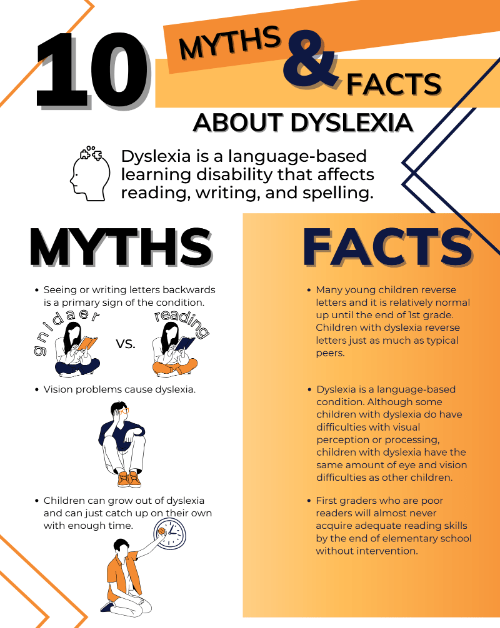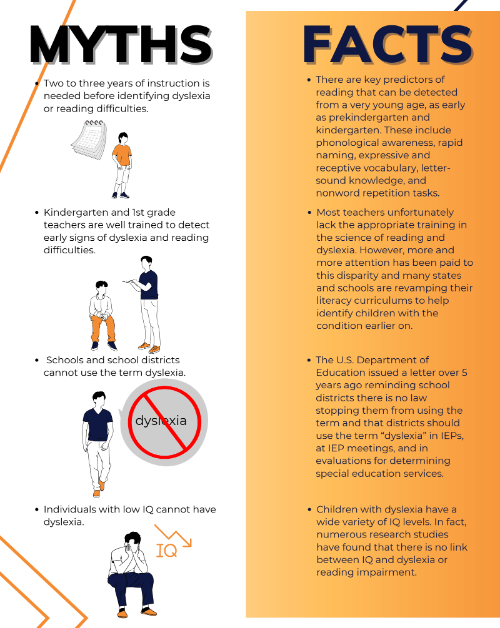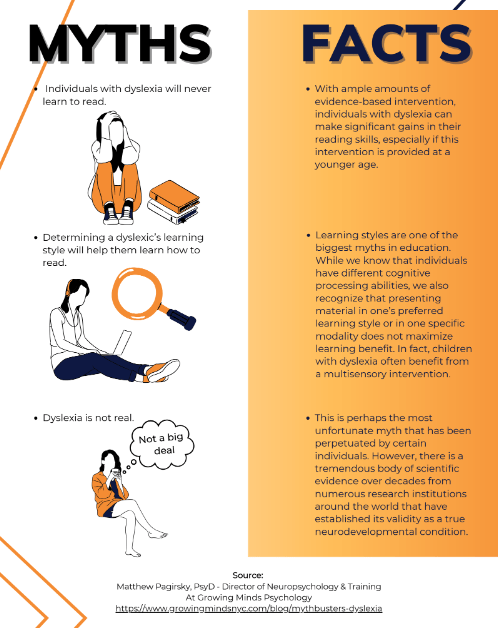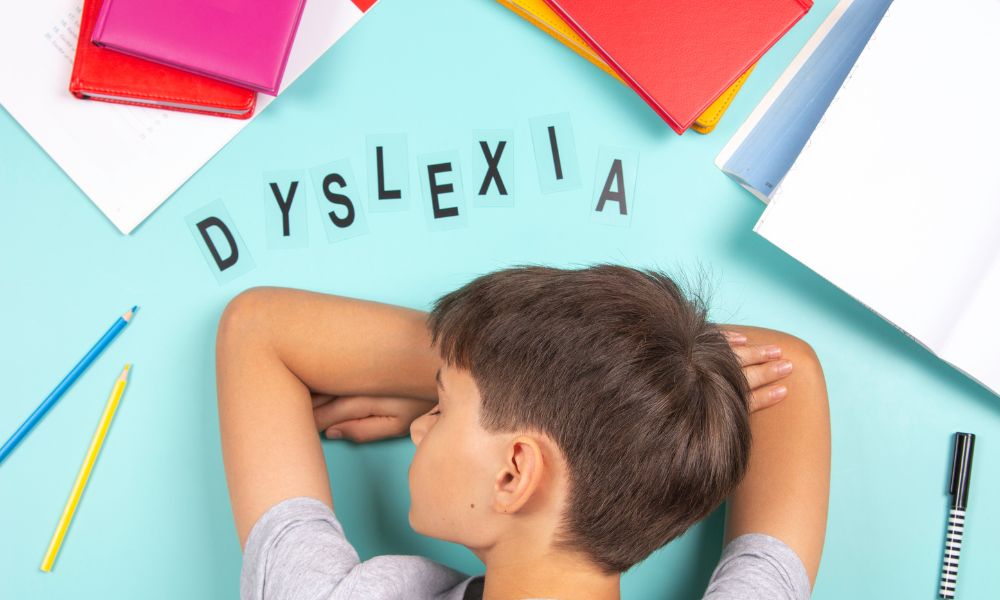
22 Dec Myths and Facts about Dyslexia
10 MYTHS AND FACTS ABOUT DYSLEXIA

Myths and Facts About Dyslexia
Dyslexia is a language-based learning disability that affects reading, writing, and spelling skills. A variety of factors—including difficulty with phonemic awareness, processing speed, and working memory—can cause it.
So here, we debunked some popular myths about dyslexia with science-backed facts. Thanks to Dr. Pagirsky, PsyD.
Myths About Dyslexia and Why They are Wrong



Download the 10 Myths and Facts PDF here.
1. Seeing or writing letters backward is a primary sign of dyslexia.
According to Understood.org, very young children can reverse letters even if they don’t have dyslexia. The symptom is not exclusive and so may also be general. A proper diagnosis is required to detect dyslexia and verify the symptoms connected to this learning disability.
2. Vision problems cause dyslexia.
There is no causal relationship between vision problems and the symptoms of dyslexia. And although seeing letters in reverse is a visual problem, it is not necessarily a symptom of dyslexia. There can be multiple causes and symptoms of dyslexia. Likewise, it can be present in children with other learning abilities and normal vision.
3. Dyslexia will go away with age.
For many people, dyslexia is a lifelong condition. However, the symptoms may lessen as they get older. Hence, it’s a common misconception that children can grow out of dyslexia and catch up with their peers eventually. While this is possible, the likelihood of dyslexia “going away” as the child grows older is slim without proper strategies and intervention. The brain, indeed, continues to develop and change throughout life. And so, the areas of the brain responsible for processing language may become more efficient over time. Children with dyslexia can learn compensatory techniques to help them cope with their condition. It is particularly true for first graders with poor reading skills. If strategies are developed and applied in time, they can build adequate reading skills by the end of elementary school.

4. Diagnosing dyslexia requires two to three years of instruction.
Key predictors of reading problems can be detected at a very young age, even in pre-kindergarten and kindergarten years. These include phonological awareness, rapid naming, expressive and receptive vocabulary, letter-sound knowledge, and nonword repetition tasks. A licensed psychologist can carefully evaluate problems in the above skills and accurately diagnose dyslexia. A professional evaluation is important to avoid misdiagnosis.
5. Kindergarten and first-grade teachers can detect dyslexia and reading problems in children.
Most teachers are not trained in the science of reading and dyslexia. The reason is that dyslexia manifests itself differently in each individual, making it hard to identify. While some students with dyslexia may have trouble reading and spelling words, others may only have difficulty with one or the other. Additionally, some students with dyslexia may excel in other areas, such as art or music, which can mask their struggles with reading and writing. This lack of knowledge can result in students with dyslexia slipping through the cracks and not receiving the accommodations they need to succeed. Proper teacher training can raise awareness, but evaluation by a licensed psychologist is necessary nonetheless.
6. Schools and school districts cannot use the term dyslexia.
Schools can use “dyslexia” and related terms where appropriate, as there is no law to hold them back. It makes it less likely to be treated as a myth or as a mysterious disorder. A letter issued by The U.S. Department of Education also reminds schools that “dyslexia” can be used. It is permitted in IEPs, at IEP meetings, and evaluations for determining special education services. Using the term where necessary makes way for open discussions and inclusivity for children diagnosed with dyslexia.

7. Children or individuals with low IQs can’t have dyslexia.
Numerous research studies have found no link between IQ and dyslexia or reading impairment. Children with dyslexia have a wide variety of IQ levels. It’s also possible for them to have above-average IQs despite difficulty with reading, writing, and spelling.
People with dyslexia can excel in fields other than reading and writing, such as art, music, and design. Many successful entrepreneurs, scientists, and politicians had or have dyslexia. Some prominent examples include Albert Einstein, Pablo Picasso, and Leonardo Da Vinci.
8. Individuals with dyslexia will never learn to read.
In reality, early diagnosis and intervention at a younger age can have a significant impact on a child with dyslexia. While there is no ‘cure’ for dyslexia, individuals with dyslexia can learn to read with specialized instruction and accommodations.
9. A specific learning style will help a dyslexic child to read properly.
Expert opinions vary regarding the idea of individual learning styles. Although it is true that people have different cognitive abilities. For people with dyslexia, a multisensory learning style is often the most effective. It involves using multiple senses to learn new information. For people with dyslexia, this type of learning can be very helpful because it allows them to process information in many ways.
The Orton-Gillingham approach is a highly successful multisensory approach designed to help individuals who struggle with reading, writing, spelling, or any combination of the three. This multisensory approach is commonly used as an instructional method for children with dyslexia.
10. Dyslexia is not real.
It is the most unfortunate myth. In reality, dyslexia exists, and it is a learning disability that affects reading skills. It is in no way related to a lack of motivation or laziness. As of 2022, plenty of scientific evidence have supported the fact that dyslexia is a true neurodevelopmental condition. Research studies from the Dyslexia Foundation demonstrate that the brains of those with dyslexia have different metabolic activation patterns than those without reading difficulties. Acknowledging dyslexia is critical because it can impact school performance, employment, and quality of life.
Conclusion
Individuals with dyslexia struggle with literacy. Dyslexia is characterized by difficulty with phonemic awareness, phonology, and word decoding. It can also impact spelling and writing skills. With the right support, individuals with dyslexia can develop stronger literacy skills and can succeed in school and life.
At Themba Tutors, we can help clear your misconceptions about dyslexia. Reach out to us to learn more about dyslexia.
Need help with dyslexia? Chat with Themba Tutors Today!
Our dyslexia tutors, and coaches are ready to help you right now!
We travel to the following locations: Manhattan, Brooklyn, Queens, Staten Island, Bronx, Long Island (Nassau & Suffolk Counties), Westchester County, Connecticut (CT),and New Jersey (NJ).
Free Consultation!!!
Call: (917) 382-8641, Text: (833) 565-2370
Email: [email protected]
(We respond to email right away!)
References
FAQs about reversing letters, writing letters backwards, and dyslexia
https://www.understood.org/en/articles/faqs-about-reversing-letters-writing-letters-backwards-and-dyslexia
Mayo Clinic – Dyslexia Symptoms and Causes
https://www.mayoclinic.org/diseases-conditions/dyslexia/symptoms-causes/syc-20353552
Cleveland.org – Diagnosing Dyslexia
https://my.clevelandclinic.org/health/articles/6005-dyslexia#diagnosis-and-tests
Letter by the US Department of Education
https://www.understood.org/en/articles/answering-your-questions-about-the-new-government-letter-on-dyslexia-dysgraphia-and-dyscalculia
Dyslexia and the need for teacher training
https://files.eric.ed.gov/fulltext/EJ1160817.pdf&ved=2ahUKEwjckN-km936AhWF_IUKHQqjDRUQFnoECBEQAQ&usg=AOvVaw1PG-v-t39fGYK1pXx5jloC
Multisensory teaching for dyslexia
https://www.ldau.org/multisensory-teaching-for-dyslexia#:~:text=Effective%20instruction%20for%20students%20with,and%20learning%20of%20written%20language
Dyslexia Foundation
https://dyslexiafoundation.org/
Child Mind Institute – Understanding Dyslexia
https://childmind.org/article/understanding-dyslexia/
What is Dyslexia?
https://www.understood.org/en/articles/what-is-dyslexia
12 famous people who struggled with dyslexia
https://journal.imse.com/12-famous-people-who-struggled-with-dyslexia-before-changing-the-world/
Craig Selinger
Latest posts by Craig Selinger (see all)
- Psychotherapy and Support Services at Cope With School NYC - April 12, 2024
- NYC Parents of Teens Support Group - April 8, 2024
- Here I Am, I Am Me: An Illustrated Guide to Mental Health - April 4, 2024

No Comments